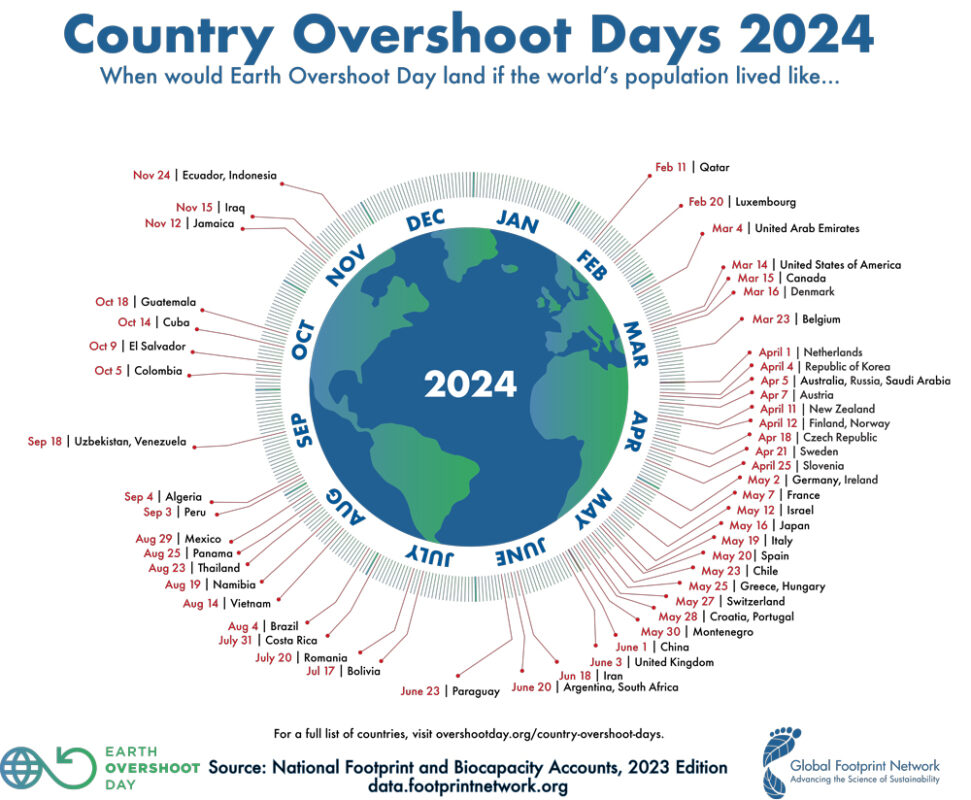We’ve already used our share of natural resources for 2024 – what now?
March 16th, 2024, marked a remarkable and thought-provoking event in Denmark – Overshoot Day. This is the day when Denmark’s consumption exceeds the Earth’s natural resources that the planet can regenerate in a year – 12 days earlier than last year, indeed as one of the first countries in the world this year. This phenomenon sheds light on the urgent need to reconsider our resource consumption and how we handle waste, especially within the business sector.

Electronic waste, or e-waste, is one of the fastest-growing waste streams globally, with millions of tons generated annually. This waste contains valuable materials that, if not recycled properly, can pose serious environmental and health risks. Denmark, known for its green agenda and innovative approach to sustainability, faces a unique challenge but also an opportunity to lead the way in responsible e-waste management.
Key Facts about Electronic Waste
- Globally, more than 50 million tons of e-waste are generated annually, and only a fraction of this is properly recycled.
- Denmark is among the countries with a high per capita consumption of electronics, contributing to the country’s electronic waste.
- Recycling electronic waste can not only reduce the environmental burden but also recover valuable materials such as gold, silver, copper, and rare earth elements.
Reducing Electronic Waste in Business
The business sector plays a crucial role in addressing the e-waste problem. By implementing strategies such as extended producer responsibility, where manufacturers are held accountable for the entire lifecycle of their products, companies can significantly reduce the amount of e-waste. This includes designing products with longer lifespans, easier maintenance, and greater potential for recycling.
R2v3 Certification: A Standard for Responsible Recycling
The recent achievement of R2v3 certification by Inside Systems highlights the company’s commitment to sustainability and responsible recycling of electronics. The R2v3 standard is the leading global benchmark for companies dealing with the recycling and reuse of electronic devices. It ensures that the processes for handling, recycling, and disposal of e-waste are conducted in an environmentally sound and socially responsible manner.
Also read: How R2v3 Certification Makes a Difference
For Inside Systems, this certification means not only recognition of their current sustainability practices but also a commitment to continuous improvement and innovation in e-waste management. By adhering to the R2v3 standard, Inside Systems can assure their customers that their retired electronic equipment is handled in the most sustainable way possible.
To further combat the e-waste problem and promote sustainability within the business sector, Inside Systems proposes several strategies:
- Responsible Disposal: Companies should prioritize partnerships with R2v3-certified firms to ensure their retired electronics are handled responsibly.
- Longer Product Lifecycles: By investing in quality equipment and prioritizing repair over replacement, companies can extend the lifespan of their IT equipment, reducing the amount of e-waste.
- Reuse and Recycling: Promote the reuse of IT equipment within the organization and seek opportunities to donate retired, but still functioning equipment to schools, charities, and small businesses that could benefit from it.
- Awareness and Education: Educate employees about the importance of sustainable e-waste management and implement internal policies for proper waste handling and recycling.
- Innovation and Sustainability in Purchasing: Choose environmentally friendly products and services and integrate sustainability criteria into purchasing decisions to support a circular economy.
The Way Forward
To address the challenge of Overshoot Day and the growing stream of e-waste, we urge other companies to follow in our footsteps by committing to sustainable practices and achieving R2v3 certification. Together, we can create a more sustainable future where we not only meet our current needs but also ensure that future generations can enjoy a healthy and resource-rich planet.